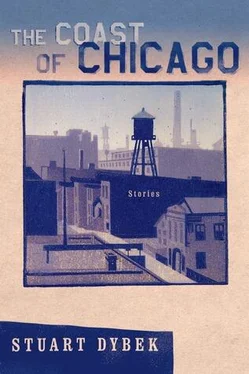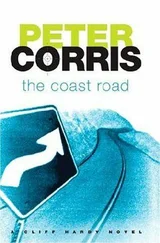Stuart Dybek - The Coast of Chicago - Stories
Здесь есть возможность читать онлайн «Stuart Dybek - The Coast of Chicago - Stories» весь текст электронной книги совершенно бесплатно (целиком полную версию без сокращений). В некоторых случаях можно слушать аудио, скачать через торрент в формате fb2 и присутствует краткое содержание. Год выпуска: 2004, Издательство: Picador, Жанр: Современная проза, на английском языке. Описание произведения, (предисловие) а так же отзывы посетителей доступны на портале библиотеки ЛибКат.
- Название:The Coast of Chicago: Stories
- Автор:
- Издательство:Picador
- Жанр:
- Год:2004
- ISBN:нет данных
- Рейтинг книги:5 / 5. Голосов: 1
-
Избранное:Добавить в избранное
- Отзывы:
-
Ваша оценка:
- 100
- 1
- 2
- 3
- 4
- 5
The Coast of Chicago: Stories: краткое содержание, описание и аннотация
Предлагаем к чтению аннотацию, описание, краткое содержание или предисловие (зависит от того, что написал сам автор книги «The Coast of Chicago: Stories»). Если вы не нашли необходимую информацию о книге — напишите в комментариях, мы постараемся отыскать её.
is a masterpiece from one of America’s most highly regarded writers.
The Coast of Chicago: Stories — читать онлайн бесплатно полную книгу (весь текст) целиком
Ниже представлен текст книги, разбитый по страницам. Система сохранения места последней прочитанной страницы, позволяет с удобством читать онлайн бесплатно книгу «The Coast of Chicago: Stories», без необходимости каждый раз заново искать на чём Вы остановились. Поставьте закладку, и сможете в любой момент перейти на страницу, на которой закончили чтение.
Интервал:
Закладка:
Dzia-Dzia stopped and listened. Marcy had begun to play again very faintly. If he had asked me to guess what she was playing I would have said a prelude, the one called “The Raindrop.”
I heard the preludes on Saturday nights, sunk up to my ears in bathwater. The music traveled from upstairs through the plumbing, and resonated as clearly underwater as if I had been wearing earphones.
There were other places I discovered where Marcy’s playing carried. Polonaises sometimes reverberated down an old trash chute that had been papered over in the dining room. Even in the parlor, provided no one else was listening to the radio or flipping pages of a newspaper, it was possible to hear the faintest hint of mazurkas around the sealed wall where the stovepipe from the space heater disappeared into what had once been a fireplace. And when I went out to play on the landing, bundled up as if I was going out to climb on the drifts piled along Eighteenth Street, I could hear the piano echoing down the hallways. I began to creep higher up the stairs to the top floor, until finally I was listening at Mrs. Kubiac’s door, ready to jump away if it should suddenly open, hoping I would be able to think of some excuse for being there, and at the same time almost wishing they would catch me.
I didn’t mention climbing the stairs in the hallway, nor any of the other places I’d discovered, to Dzia-Dzia. He never seemed interested in anyplace other than the kitchen table. It was as if he were attached to the chair, rooted in his bucket.
“Going so early? Where you rushing off to?” he’d ask at the end of each evening, no matter how late, when I’d put my pencil down and begun buckling my books into my satchel.
I’d leave him sitting there, with his feet in his empty bucket, and his fingers, tufted with the same white hair as his ears, still tracing arpeggios across the tabletop, though Marcy had already stopped playing. I didn’t tell him how from my room, a few times lately after everyone was asleep, I could hear her playing as clearly as if I were sitting at her feet.
Marcy played less and less, especially in the evenings after supper, which had been her regular time.
Dzia-Dzia continued to shake the table nightly, eyes closed, hair flying, fingers thumping, but the thump of his fingers against the oilcloth was the only sound other than his breathing — rhythmic and labored as if he were having a dream or climbing a flight of stairs.
I didn’t notice at first, but Dzia-Dzia’s solos were the start of his return to silence.
“What’s she playing, Lefty?” he demanded more insistently than ever, as if still testing whether I knew.
Usually now, I did. But after a while I realized he was no longer testing me. He was asking because the sounds were becoming increasingly muddled to him. He seemed able to feel the pulse of the music but could no longer distinguish the melodies. By asking me, he hoped perhaps that if he knew what Marcy was playing he would hear it clearly himself.
Then he began to ask what she was playing when she wasn’t playing at all.
I would make up answers. “The polonaise…in A-flat major.”
“The polonaise! You always say that. Listen harder. Are you sure it’s not a waltz?”
“You’re right, Dzia-Dzia. It’s the ‘Grande Valse’.”
“The ‘Grande Valse’…which one is that?”
“A-flat, Opus 42. Paderewski’s favorite, remember? Chopin wrote it when he was twenty-one, in Vienna.”
“In Vienna?” Dzia-Dzia asked, then pounded the table with his fist. “Don’t tell me numbers and letters! A-flat, Z-sharp, Opus o, Opus 1,000! Who cares? You make it sound like a bingo game instead of Chopin.”
I was never sure if he couldn’t hear because he couldn’t remember, or couldn’t remember because he couldn’t hear. His hearing itself still seemed sharp enough.
“Stop scratching with that pencil all the time, Lefty, and I wouldn’t have to ask you what she’s playing,” he’d complain.
“You’d hear better, Dzia-Dzia, if you’d take the kettle off the stove.”
He was slipping back into his ritual of boiling water. The kettle screeched like a siren. The windows fogged. Roofs and weather vanished behind a slick of steam. Vapor ringed the overhead light bulbs. The vaguely metallic smell of the fizzing pink tablets hung at the end of every breath.
Marcy played hardly at all by then. What little she played was muffled, far off as if filtering through the same fog. Sometimes, staring at the steamed windows, I imagined Eighteenth Street looked that way, with rings of vapor around the streetlights and headlights, clouds billowing from exhaust pipes and manhole covers, breaths hanging, snow swirling like white smoke.
Each night water hissed from the kettle’s spout as from a blown valve, rumbling as it filled the bucket, brimming until it slopped over onto the warped linoleum. Dzia-Dzia sat, bony calves half submerged, trousers rolled to his knees. He was wearing two suits again, one over the other, always a sure sign he was getting ready to travel, to disappear without saying good-bye. The fingers of his left hand still drummed unconsciously along the tabletop as his feet soaked. Steam curled up the arteries of his scalded legs, hovered over his lap, smoldered up the buttons of his two vests, traced his mustache and white tufts of hair until it enveloped him. He sat in a cloud, eyes glazed, fading.

I began to go to bed early. I would leave my homework unfinished, kiss Mother good night, and go to my room.
My room was small, hardly space for more than the bed and bureau. Not so small, though, that Dzia-Dzia couldn’t have fit. Perhaps, had I told him that Marcy played almost every night now after everyone was sleeping, he wouldn’t have gone back to filling the kitchen with steam. I felt guilty, but it was too late, and I shut the door quickly before steam could enter and fog my window.
It was a single window. I could touch it from the foot of the bed. It opened onto a recessed, three-sided air shaft and faced the roof of the building next door. Years ago a kid my age named Freddy had lived next door and we still called it Freddy’s roof.
Marcy’s window was above mine. The music traveled down as clearly as Marcy said my crying had traveled up. When I closed my eyes I could imagine sitting on the Oriental carpet beside her huge piano. The air shaft actually amplified the music just as it had once amplified the arguments between Mr. and Mrs. Kubiac, especially the shouting on those nights after Mr. Kubiac had moved out, when he would return drunk and try to move back in. They’d argued mostly in Bohemian, but when Mr. Kubiac started beating her, Mrs. Kubiac would yell out in English, “Help me, police, somebody, he’s killing me!” After a while the police would usually come and haul Mr. Kubiac away. I think sometimes Mom called them. One night Mr. Kubiac tried to fight off the police, and they gave him a terrible beating. “You’re killing him in front of my eyes!” Mrs. Kubiac began to scream. Mr. Kubiac broke away and, with the police chasing him, ran down the hallways pounding on doors, pleading for people to open up. He pounded on our door. Nobody in the building let him in. That was their last argument.
The room was always cold. I’d slip, still wearing my clothes, under the goose-feather-stuffed piersyna to change into my pajamas. It would have been warmer with the door open even a crack, but I kept it closed because of the steam. A steamed bedroom window reminded me too much of the winter I’d had pneumonia. It was one of the earliest things I could remember: the gurgling hiss of the vaporizer and smell of benzoin while I lay sunk in my pillows watching steam condense to frost on the pane until daylight blurred. I could remember trying to scratch through the frost with the key to a windup mouse so that I could see how much snow had fallen, and Mother catching me. She was furious that I had climbed out from under the warmth of my covers and asked me if I wanted to get well or to get sicker and die. Later, when I asked Dr. Shtulek if I was dying, he put his stethoscope to my nose and listened. “Not yet.” He smiled. Dr. Shtulek visited often to check my breathing. His stethoscope was cold like all the instruments in his bag, but I liked him, especially for unplugging the vaporizer. “We don’t need this anymore,” he confided. Night seemed very still without its steady exhaling. The jingle of snow chains and the scraping of shovels carried from Eighteenth Street. Maybe that was when I first heard Marcy practicing scales. By then I had grown used to napping during the day and lying awake at night. I began to tunnel under my piersyna to the window and scrape at the layered frost. I scraped for nights, always afraid I would get sick again for disobeying. Finally, I was able to see the snow on Freddy’s roof. Something had changed while I’d been sick — they had put a wind hood on the tall chimney that sometimes blew smoke into our flat. In the dark it looked as if someone was standing on the roof in an old-fashioned helmet. I imagined it was a German soldier. I’d heard Freddy’s landlord was German. The soldier stood at attention, but his head slowly turned back and forth and hooted with each gust of wind. Snow drove sideways across the roof, and he stood banked by drifts, smoking a cigar. Sparks flew from its tip. When he turned completely around to stare in my direction with his faceless face, I’d duck and tunnel back under my piersyna to my pillows and pretend to sleep. I believed a person asleep would be shown more mercy than a person awake. I’d lie still, afraid he was marching across the roof to peer in at me through the holes I’d scraped. It was a night like that when I heard Mother crying. She was walking from room to room crying like I’d never heard anyone cry before. I must have called out because she came into my room and tucked the covers around me. “Everything will be all right,” she whispered; “go back to sleep.” She sat on my bed, toward the foot where she could look out the window, crying softly until her shoulders began to shake. I lay pretending to sleep. She cried like that for nights after my father was killed. It was my mother, not I, whom Marcy had heard.
Читать дальшеИнтервал:
Закладка:
Похожие книги на «The Coast of Chicago: Stories»
Представляем Вашему вниманию похожие книги на «The Coast of Chicago: Stories» списком для выбора. Мы отобрали схожую по названию и смыслу литературу в надежде предоставить читателям больше вариантов отыскать новые, интересные, ещё непрочитанные произведения.
Обсуждение, отзывы о книге «The Coast of Chicago: Stories» и просто собственные мнения читателей. Оставьте ваши комментарии, напишите, что Вы думаете о произведении, его смысле или главных героях. Укажите что конкретно понравилось, а что нет, и почему Вы так считаете.












